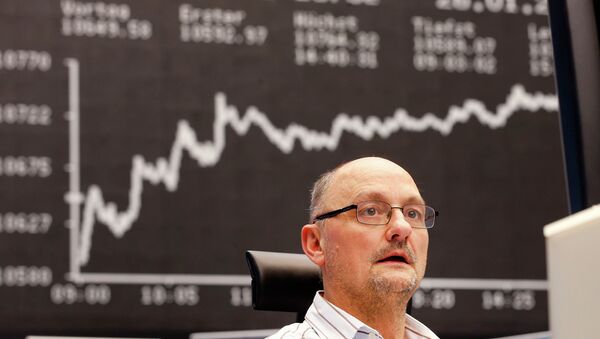Kristian Rouz — Bond markets are rallying in Germany, while most major fixed-income markets are on a losing streak. German governmental debt has become a sort of ‘safe haven' as major challenges are brewing in the periphery of the Eurozone, the most significant being the uncertainty created by the unraveling Greek debt crisis.
Greece has failed thus far to lay a stable foundation for its relations with international creditors, as the Southern-European nation once again finds itself unable to fulfill its financial obligations and conduct systemic reforms. Athens' deal with creditors is due Sunday, if no agreement is reached, it is very unlikely that Greece will be able to fund its next debt repayment tranche, and technical default is the most likely development going forward. Although a deal is not out of reach, many European and international investors are preparing for the worst, moving capital out of Greece. Simultaneously, a significant rise in demand for Deutsche Bunds has been spotted recently, as market participants are hedging their risks buying into safer assets.
Yet, there is no clarity in this regard so far. Investors are looking forward for an indication whether Greece will be able to make its IMF payments of 1.6 bln euros due on 5 June. While the prolonged wait and uncertainty linger, investors are buying into German debt, not least in order to weather the storm should Greece fail to reach consensus with the creditors and actually default.
Greece's negotiations with its creditors "are progressing faster but not yet fast enough to conclude," French Finance Minister Michel Sapin said.
A 10-year Deutsche Bund rose 1.1% to 100.12 euros, while the yield fell 0.12%, to 0.49% over the past week.
Most fixed-income markets declined in May as investors found more profitable newly emerging opportunities, associated with higher risks and greater volatility. However, in German Bunds, most market participants are expecting only a further decline in yields, meaning these securities are becoming a ‘safe haven' type of asset
Total volume of deposits in Greek banks decreased 3.6% in April to some 133.7 bln euros, down from 138.6 bln euros the previous month, according to data published by the Bank of Greece. Further developments are gloomy, according to some estimates, as trends are negative for Greece's financial system due to high political uncertainty. Investors do not see Athens as committed enough to avoiding the looming default, while the actual political statements are sending very controversial signals to the markets.
German debt securities are consensus-expected to go up in price at least untill the middle of next week, with the yield inevitably falling. Lower returns are not a concern at this point. In other circumstances, an influx of capital into German debt would have been long exhausted with a sell-off more likely, however, this is not happening until the Greek situation becomes clearer. And, in case no deal is agreed, the demand for Deutsche Bunds is likely to increase even further as a default within the Eurozone and a possible subsequent Grexit will trigger major headwinds to the markets, driving a greater demand for ‘safe havens.'




